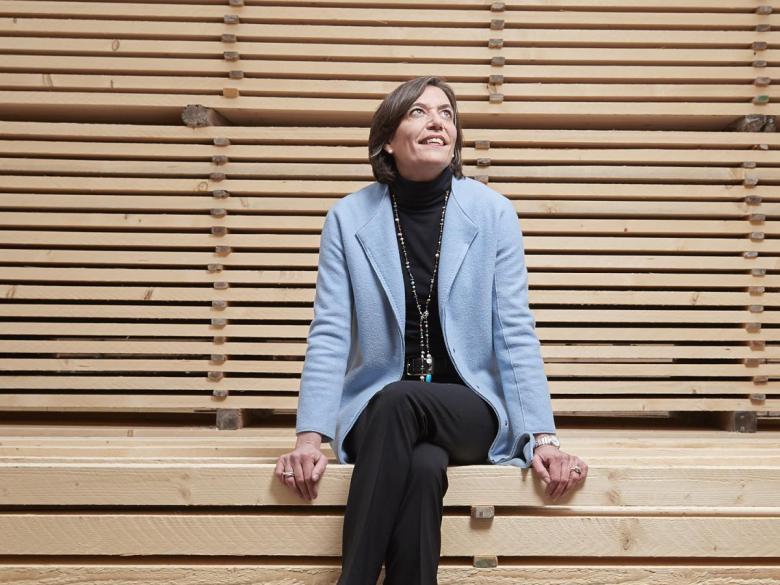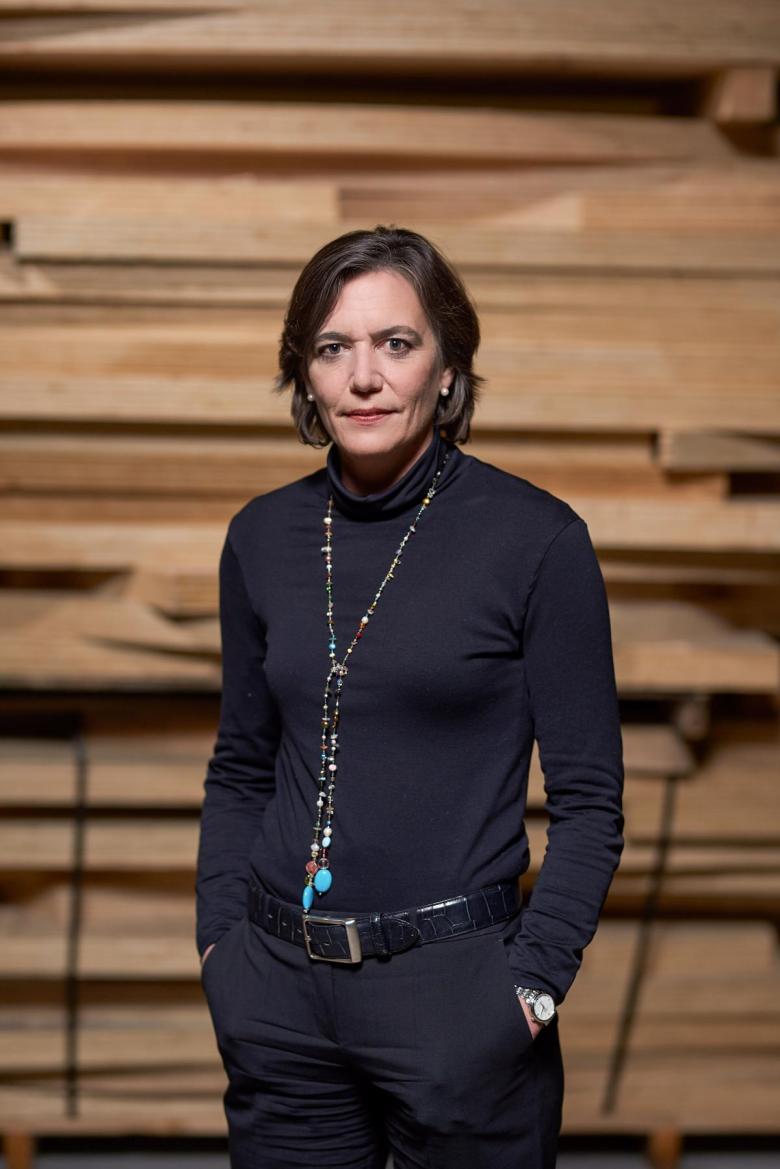Interview with Katharina Lehmann, timber construction entrepreneur
"There are few conflicting goals between ecology, social sustainability, and economic efficiency"
Is idealism economically sensible? Yes, says Katharina Lehmann. In an interview with Swiss-Architects editor Elias Baumgarten she talks about values, what it means to be a female boss, and why coercive measures are not enough to stop climate change.
Mrs. Lehmann, when you took over the management of the Lehmann Group you were in your early twenties and still in the middle of your studies. Why was that?
That was a stopgap solution. It wasn’t my plan at the time to take over the company. I was studying business administration and could think of all kinds of jobs I could take on. But then my father suffered a stroke and I had to come up with a solution. I took over the management of the company. I quickly took a liking to this task. Again and again, new challenges had to be mastered, which motivated and appealed to me. And so I stayed — to this day.
Not only have you stayed, but you have turned Blumer Lehmann into a company that is in demand far beyond Switzerland, with projects everywhere from Great Britain to Korea. Today, the expertise of your team is appreciated worldwide. How did you as a young woman manage to assert yourself in the male-dominated timber industry?
The gender issue was and is not a big issue for me. Nor would I say that I had any trouble asserting myself. What was difficult for me at the beginning, however, was being the only woman — I always felt like I was on display in a shop window. I had a different way of thinking than many of my male colleagues. The female perspective is sometimes different from that of men. In any case, it took some time before I was confident enough to stand by my opinion and defend it resolutely. Building up the necessary self-confidence was a process.
You radiate authority and you seem very determined. When you express your opinion, you are very clear about what you want to say. Everything is intelligible and seems well-considered. Does that help you to be heard and taken seriously by your colleagues? Did you have to work hard to develop this quality?
Communication is very important. The message is one thing, but above all it’s the right tone and the right demeanor that matter. I never was a shy little girl. Nonetheless, I had to learn a lot. My education certainly helped me and so did the fact that I have always traveled a lot; in my youth, for example, I went to Africa with my backpack right after finishing school. This time has shaped me. Most importantly, I realized that my views and standards don’t necessarily work in a different context — that was a very important lesson. I acquired a great tolerance for other positions and attitudes. This has helped me again and again and I benefit from it when I negotiate or talk things out with others.
Did you never have to deal with prejudices against you as a boss?
Of course, there were prejudices. But a lot has changed since the 1990s. For example, I needed a loan at the very beginning. The banker had reservations and said that I personally was the risk. If I were to get pregnant soon, I would no longer be available as a boss, and Blumer Lehmann would lose its creditworthiness. I always dealt with such difficult statements leniently, because at that time a woman in a management position was really still something quite unusual, and people had to get used to it first.
Today, I only experience sexism in situations where men want to make themselves look better at the expense of women. I no longer need to fight to be taken seriously. But that comes at a price: meanwhile, I sometimes miss the nuances. Today, I sometimes feel like I’m being treated like a neuter. That’s a pity. I like to be a woman!
I don’t think we’ve really gotten rid of old role models and stereotypes yet. Just one example: I notice that mothers who are successful in their jobs — whether it’s the triathlete Nicola Sprig, the outstanding photographer Pia Zanetti or simply a colleague at work — still have to put up with the question of whether they don’t have a bad conscience towards their children. And such statements are expressed by both men and women.
We have to differentiate: there are differences between the generations. Today, I work with young men who have a different perception of women. In general, many young people deal with diversity as a matter of course; they have far fewer reservations and prejudices than my generation. As important as it is, I don’t think that the endless discussion of the gender issue is productive. We are talking young people into believing that there is a problem, one that they have already made much more progress in solving than we have. We need mutual respect and must meet as equals — but not in a tense way.
Women are outnumbered in key positions in the economy. That’s why there are repeated calls for quotas, and in some places, they’ve even been introduced. What do you think of this?
I am completely against the introduction of quotas. What about people who have an impairment? What about homosexuals or diverse people? What about people of color or people from other cultures in general? I think quotas are unfair. Today I receive offers for mandates that are not addressed to me because of my qualifications but simply because I am a woman. Isn’t that devaluing?
How can we improve the situation?
The best way to promote women is through role models. There is no doubt that women can take on all the important tasks in our society — but do they want to? Do they have the courage to do it? Do they have the necessary self-confidence? This is where we need to start. Women should be encouraged to develop their potential. That still happens far too little. In addition, work still needs to be done to improve the compatibility of family and career.
Let’s jump topics and talk about responsibility. You have a clear set of values. You advocate sustainable timber construction and, in addition to your work at Blumer Lehmann, you are committed to sustainable tropical forest management. But as an entrepreneur, you have to think economically. To what extent are you forced to make compromises?
I’m not forced at all. Sure, you can optimize profits in the short term and turn a blind eye to other aspects. Yet I prefer to think in the long term. This means there is little conflict between ecology, social sustainability, and profitability.
Is environmental protection your economic interest?
Of course! I will give you an example: if global warming continues, our forests will change. Then we will no longer be able to depend on fir and spruce in Switzerland. The raw material wood will change. For the Lehmann Group, this would pose a great challenge and drastic consequences. We would have to develop new building products and seek approvals. If we were not successful at this, the company’s existence would be at stake.
What is your contribution to combating climate change?
I believe that we can make a great contribution to a better, more resource-efficient world with wooden buildings or other products. In addition to our products, we also pay particular attention to how we provide our services. For example, we already produce as much green electricity as required for our infrastructure and facilities. We also do our utmost to support heartfelt projects. For example, we built an apiary for the Swiss Bee Family conservation project in Frasnacht. It is a well-known fact that the bee population in Switzerland is endangered and that the consequences for the local ecosystem are very serious. By the way, we not only support projects that benefit environmental protection, but also work with organizations for the disabled, among others. After all, sustainability is not limited to an ecological component; it also a social and economic one.
Let’s also talk about your products. You like to state that wood is the epitome of sustainability. But just because we build with wood doesn’t automatically make a project sustainable and ecologically safe. What is the best way to exploit the advantages of this building material?
First of all, by not building unnecessary new projects. Currently, there are still too few conversions and further construction projects in Switzerland, and all too often we demolish buildings that could be adapted to serve a new purpose. Wood offers great prerequisites for climate-neutral construction. It is important to keep transport distances short. Wood is particularly environmentally friendly when it is processed and used close to its place of origin. Local value creation is the most sustainable option from an economic and social point of view. For the future, we also need to find solutions to build with wood with more intelligent approaches, in a more dematerialized way. For I am convinced that the demand will continue to rise; the enthusiasm for timber construction is not a fashion trend! We will have to learn to use the raw material wood more sparingly. Moreover, the structures in timber construction are becoming increasingly complicated and comprise more and more layers. This is often unnecessary and affects recyclability. Building with wood must therefore become simpler. It is also important to take a closer look at composite materials in the future. What materials other than wood are used? Are they ecologically safe? Can they be recycled?
What I would like to see from architects are high-quality, robust, and flexible designs that allow for a long service life. It is also important to critically question our demands: how much comfort is necessary? What interior temperature do we want? How much space do we need? Do we really need a guest room in every apartment or is one enough per apartment building?
You broach the issue of our demanding attitude. To stop climate change, we would have to be modest and reconsider our (consumer) behavior. So far, however, this has hardly been achieved. Do we need coercive measures?
I’m against coercion in principle, but this issue can’t be solved without it. However, I consider it important that we simultaneously promote new technologies. The wagging finger alone won’t straighten things out. Stricter rules and forced changes in behavior will only help us in the short term. Imagine, on the other hand, if we could continue to drive cars — but without polluting the air, and perhaps even cleaning it while driving. That would be a real solution.
Switzerland would have huge opportunities to make its mark in this field and contribute to decarbonization through technological innovations. This would also be of great economic interest. I would like to see greater efforts being made in this regard and politicians taking a more active interest in this topic instead of just discussing the pros and cons of compulsory measures. Capable researchers and suitable industrial partners are already waiting in the wings.
This interview was originally published as "«Es gibt wenig Zielkonflikte zwischen Ökologie, sozialer Nachhaltigkeit und Wirtschaftlichkeit» – Holzbau-Unternehmerin Katharina Lehmann" on Swiss-Architects. Translation by Bianca Murphy.
Verwandte Artikel
-
Isabel Zumtobel: 'We Believe in the Power of Design to Change the Future for the Better'
World-Architects Editors | 18.11.2025 -
-
-


